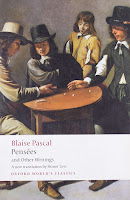A collection of fragments from his unfinished reflections on theology and man, Blaise Pascal's Pensees is in places wonderfully profound, but on the whole suffers from the fact that it was never finished or formed into a cohesive whole. Pascal, the 17th-century mathematician, also had a great theological intellect which shines through here. However, the disjointed nature of his jottings (not his fault- these were rough thoughts and never intended to be published) plus his references to now-unknown schools of thought means this work is best approached in small doses, or skimmed when time permits. Some of my favorite quotes are reprinted below, and give the idea of both his wisdom and Pensees' jilted flow.
If man is not made for God, why is he only happy with God? If man is made for God, why is he so hostile to God?
The only thing that consoles us for our miseries is distraction, yet that is the greatest of our wretchednesses.
Not only is is through Jesus Christ alone that we know God but it is only through Jesus Christ that we know ourselves.
What vanity painting is, which attracts admiration by resembling things whose originals we do not admire!
Little things comfort us because little things distress us.
Justice, like finery, is dictated by fashion.
If our condition were truly happy, we should not have to divert ourselves from thinking about it.
Description of man: Dependence, desire for independence, needs.
The world judges a great number of things in a state of natural ignorance, the true seat of man. Science has two extremes, which meet. The first is the pure state of natural ignorance at birth. The other is the point reached by those with noble souls who, having explored everything man is capable of knowing, realize they know nothing and return to their original state of ignorance. But it is a wise ignorance of self-awareness. Those who are in between, who have discarded their original state of natural ignorance but who have not yet reached the other, have a smattering of sufficient knowledge, and presume to understand it all. They upset the world, and judge everything badly.
Man's greatness lies in his capacity to recognize his wretchedness.
All men are in search of happiness. There is no exception to this, whatever different methods are employed. They all aim for this goal. So while some go to war and others do not, the same desire is in both but from different viewpoints.
. . . no one without faith, over so many years, has yet achieved that target which everyone constantly aims for. All men complain, princes, subjects, noblemen, commoners, old, young, strong, weak, learned, ignorant, healthy, sick, in every country, every age, every condition.Rating: B-
Such a lengthy, continual, and universal test ought to convince us of our powerlessness to achieve good through our own efforts . . . What does this greed and helplessness proclaim, except that there was once within us true happiness of which all that now remains is the outline and empty trace?


No comments:
Post a Comment